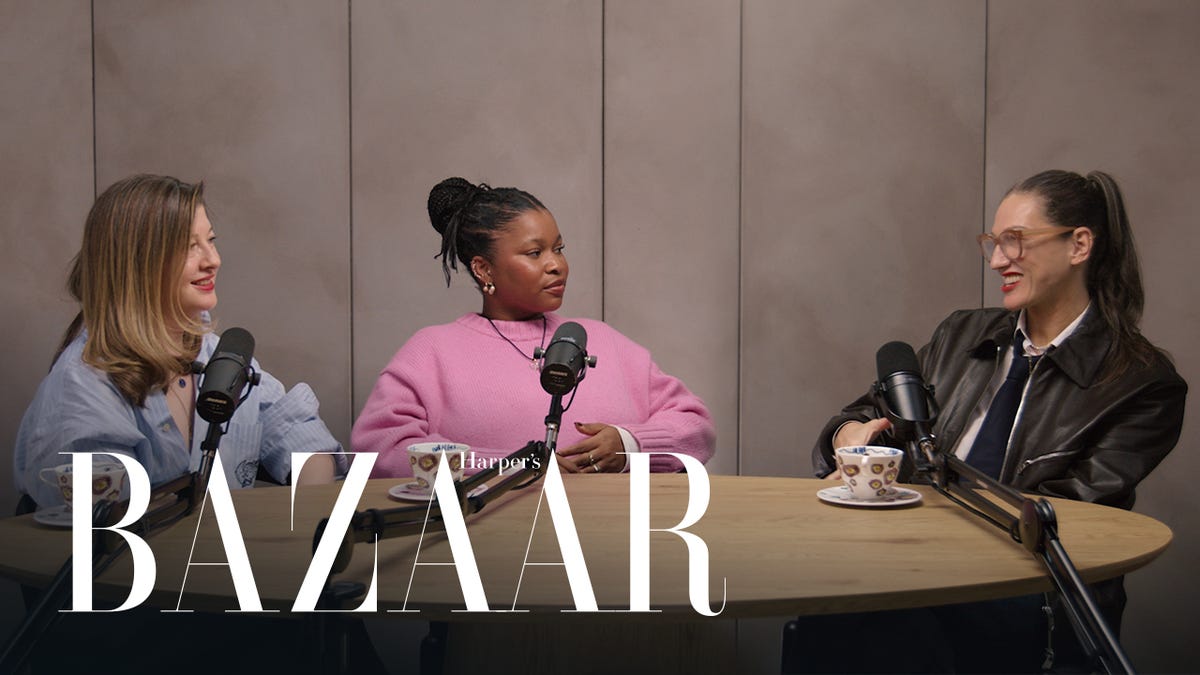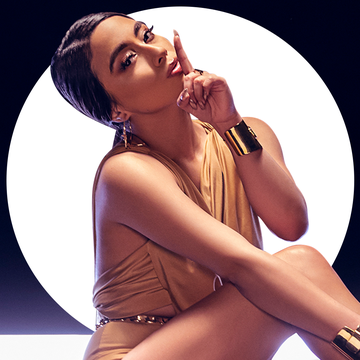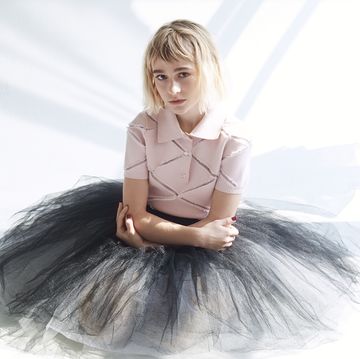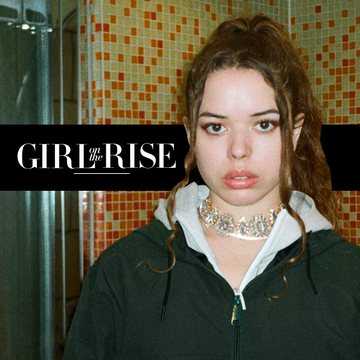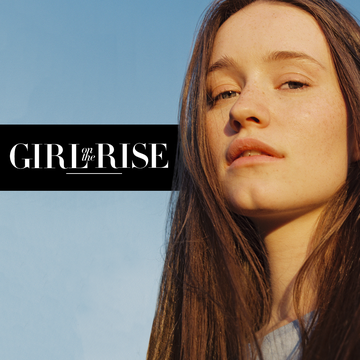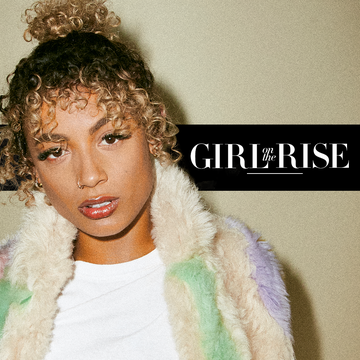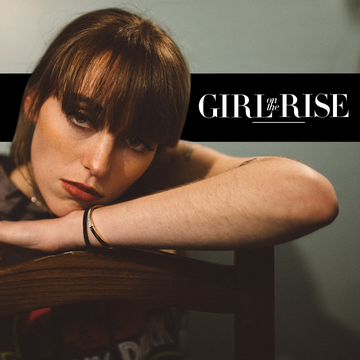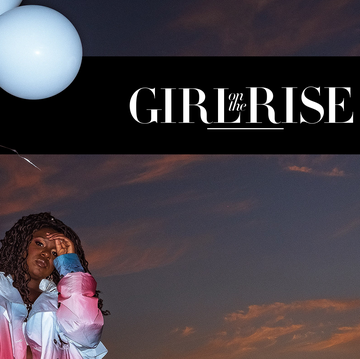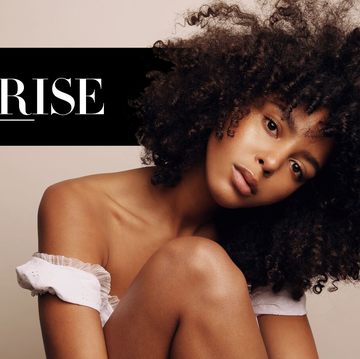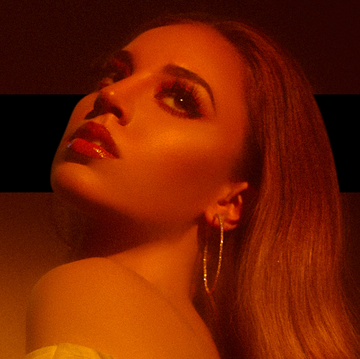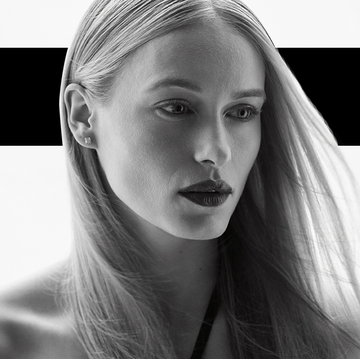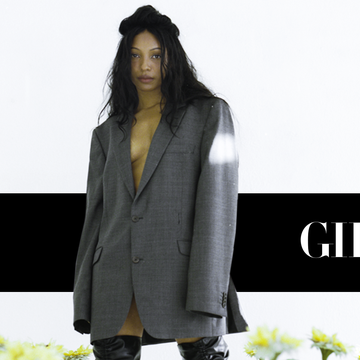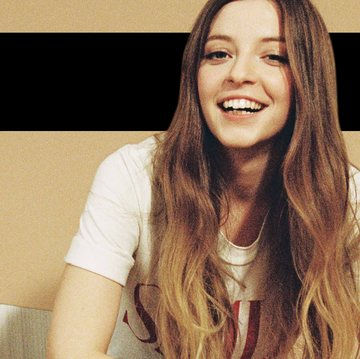Welcome to Girl Rising, our recurring interview series featuring our favorite newcomers on the verge of stardom.
When I walk into Ellie Bamber's hotel room for our interview, she's talking about pizza. Specifically, the kind she's going to order for a lunch. The conversation with her manager (her mother) and rep ensues for several minutes as she weighs the possibility of white vs. red, various toppings, etc. I sense she could talk about pizza all day, but we turn the conversation to Bamber's role in Tom Ford's latest film, Nocturnal Animals. Though her time onscreen is relatively short in comparison to co-stars Amy Adams and Jake Gyllenhaal, Bamber's portrayal of India Hastings will leave moviegoers shaken to their core.
India is a character in the book sent to Adams' character, Susan, by her ex-husband Edward (Gyllenhaal). As the book's scenes play out onscreen, India—spoiler alert!—is brutally raped and murdered, alongside her mother (Isla Fisher), by a gang of vicious, carjacking delinquents led by Ray (Aaron Taylor-Johnson, in a performance that will make your skin crawl). Bamber is chilling; I left the theater with the image of her naked, lifeless body entwined with Fisher's burned into my memory. Bamber cried when she read the script, both for her India and her father, Tony (also played by Gyllenhaal), who vows to avenge his wife and daughter's deaths. "I think if anyone else was in that situation and loved someone that much, they would probably do the same thing," she says of his dramatic trajectory. But despite the brutality of her storyline, Bamber appears to have taken delight in her scenes' logistics, admitting the stunts pumped her up—so much so that she accidentally knocked out Taylor-Johnson during a take. "Forgive me!" she says with a laugh.
The 19-year-old Brit is equally as arresting on the red carpet as she is onscreen. A major player in the fashion sphere (meltsflow.com just named her to its list of new style icons for 2017), Bamber is a muse of Chanel and, of course, Animals director Ford—she wore his body-hugging gowns exclusively for the film's press tour. She admits to being a fashion chameleon and isn't afraid to take risks, veering from unexpected prints to a slick LBD with the confidence of a red carpet veteran. Below, the rising star opens up about her harrowing role, getting naked onscreen and indulging her in her passion for pizza—at a Chanel show, no less.
Harper's BAZAAR: What led you to audition for this role in the first place?
Ellie Bamber: I got the tape through my agent, and I looked at the sheet and it said, Tom Ford, Jake Gyllenhaal, all of these people. I was like, "Well, I'm not gonna say no, am I?"
HB: You read the script and started crying—what elicited that reaction?
EB: I mean, it's shocking what happens. In fact, I even remember at Toronto, when that scene was finished, and I'm in the back of the car, there were audible gasps. People went [sharp intake of breath] and it was really loud. That's sort of the reaction I had. Then, reading about [Tony's] breakdown is really sad, and how it affects him, and how he feels so powerless. I think if anyone else was in that situation and loved someone that much, they would probably do the same thing.
HB: Obviously it's a difficult role. Can you talk about some of the challenges of playing this character?
EB: It was intense all of the time and I think that was a challenge in itself. But I also think bringing that emotion was intense. For me, I remember going back to my hotel and rather than being drained, I was like, "Wow that was so cool that I just experienced that." The challenges were going there and experiencing that every day. For creating the Texan accent, I would listen to Sissy Spacek and watch her in Badlands. I downloaded the audio of that whole film and listened to that.
HB: Did this role ever make you say, "Okay, if I can do something like this, I can do anything onscreen"?
EB: Yeah, absolutely. It's harrowing and I exerted a lot of energy. I knocked Aaron Taylor-Johnson out by accident. I knocked him out and he went down and I went down with him. He blacked out and then we both got back up in the same time. You actually see it in the movie. I didn't mean to! I didn't want to knock Aaron Taylor-Johnson out!
The physical exertion every day was a lot because I totally felt like I was fighting for my life. I remember Aaron turning to me and saying, "If you were in this situation, Ellie, you would be out of there. I know you're only using half your strength right now and you're bloody strong." You're pushing against each other and it's this mesh of trying to not hurt each other but you also have to make it visually real. So there were times when I had bruises on my body. I remember getting home one night after all of that and being so psyched up. I got a pair of trainers on, went down to the indoor gym in the motel we were in and just ran for half an hour.
HB: For you and Aaron, and the other actors playing attackers, were you able to get along and be normal when the cameras weren't rolling, or did you try to stay away from each other to create that barrier between your characters?
EB: I felt like with Aaron and everyone, it was important for them to have time with me to be friends and stuff, so they realized what I was about and I realized what they were about and we all felt safe with each other. I got on really well with Karl [Glusman], who played the curly-haired guy, and Rob [Aramayo] and Aaron. There was a certain amount of distance from them at times, where I'd be like. "Oh, why is he going over there and not wanting to talk to me?" But then I'd be like, "Oh, I get it now." So there was and there wasn't.
HB: There's a huge conversation happening right now surrounding sexual assault depictions onscreen. There was some backlash in the way Sophie Turner's rape on 'Game of Thrones' was depicted—some said it was too graphic—while others say rape needs to be shown onscreen in order to make a point about violence against women. What's your take?
EB: I think you definitely have to see it onscreen, because I don't think people really appreciate that it's going on and that it's something that needs to be talked about. You know, women are being abused all the time and it's such a sad thing, and I think Tom does it in a very respectful and tasteful way—if it can be tasteful. I think it does need to be talked about and people do need to be affected by it on screen.
My friends forced me to watch the movie with them again in the cinema and I just watched the audience. There was this woman next to me holding her mouth when it was happening, like physically shocked, and I think people need to be shocked to fully appreciate it and actually get out there and do something about it. I think it's something that, when done tastefully, in a way that is respectful, then it's something that needs to be put out there.
HB: I like what you said about tastefully, because I think when you see so much violence, you're turned off and almost desensitized to it. Tom's movies are obviously very aesthetically pleasing, and, in this case, still sending a message. I walked away from the movie and I couldn't stop thinking about those images.
EB: I think it really is a caution to people, as well, to be vigilant and careful and also understand that people are going through this. It's definitely not something that should be glamorized in any way. It's something that is awful and shocking and that's what it should be.
HB: In the scene where Jake's character Tony finds the bodies—is that you and Isla?
EB: Yeah. That's my bum! [Laughs]
HB: Were you anxious about getting naked?
EB: Well, I remember when I was younger and with my friends, we were all very carefree, running around the garden naked. So for me it was daunting in a way, but also, it's like, "Whatever, everyone has a bottom. Let's not be childish about it. It's just me." It was really important for my character's journey to reach that. I didn't want anyone else there doing it. I didn't want anyone else having control over it or having that part of the journey, because essentially that is it right there.
HB: How did you stay still for so long? You look like a mannequin.
EB: I've actually had to play dead before! When I was a bit younger I did this tiny role on The Musketeers and I had to stay dead. I remember being like this [she closes her eyes and flops on the couch]. But I had to have my eyes open. I remember the director of that being like, "You play dead very well!" And I was like, "Wow, really? Okay, thank you. I don't really know what that means." I'm not that good at it, I don't think. You just have to be really still. There were times when Tom was like, "Move your arm so it looks like it's broken" or something.
Tom was very detailed. My legs were spread out and the makeup artist—Donald Mowat, who's amazing—was putting iridescent lotion, almost like sweat, [so my legs were] glistening in the sun. He was putting it on my legs and my bottom and I was laying there, and the next minute I feel this other pair of hands going back and forth. I turned around and it was Tom! And I was like, "Never in a million years would I believe that this is happening right now!" It was great, actually, to see a director get that involved.
HB: Tell me about working with Tom. Did he give you any specific notes about your character before you started shooting?
EB: I saw all of his beautiful mood boards that I think were really a help, and he talked to me about how Texas people live, how religious they are and what their ideals are and what their way of life is. He really talked to me about the naivety of my character and how, although she's naive and she's provocative and she's pushing all the buttons, she essentially only means good and we shouldn't blame her for any of what she does.
He was also great with the accent. There were times I said a line and he was like, "No, that wasn't very good. Do that again." You sort of want it in-between, because there's a modern Texan way of speaking where they don't sound very Texas, and there's also, obviously, an older version where there's a very thick Texas accent. So we strove for something in between the two because, again, this is a book, so how much of it's real? We were able to have that array—we could go right in the middle, we could use a bit of this and use a bit of that and create something.
HB: Had you been to Texas before you shot it?
EB: I hadn't. I've never been to Texas. We weren't filming in Texas, we were filming in the Mojave Desert, but I binge-watched Friday Night Lights. Taylor Kitsch, I couldn't stop looking at him. It was the best, because I actually felt like I was doing work as well, like, [mocks herself], "This is so useful, so good for my journey as an actor."
HB: I know you got your start with stage acting. How is it different from being in front of the camera?
EB: It's very immediate. You get a reaction immediately, which is really nice. With stage, it's very tough. You have to have a lot of stamina—you're doing eight shows a week for 19 weeks. The same thing, every night. Twice a day, somedays. The only full day I actually had off was Sunday. And every night is different. I remember one night, one of the actresses didn't come onstage [at her cue], and it was the most exciting thing. Me and this other actor, we were just sitting there. We had to make up all of this stuff. She was meant to come on and send me off to bed, so I was saying, "Oh, I think I should go to bed now, I'm really tired." It was something weird like that, but it was so exciting because that had never happened [to me] before!
But the great thing about it, I think, is every night you discover something new about your character and every night you can try something different. I admire anyone who does stage all their life. It's so tough and it also made me really appreciate how lucky I am with film. You have to do your own makeup with stage and you have to do so many un-glamorous things. And then I got to a film set a few months later, where a car picks me up in the morning and I roll up on set and there's a coffee waiting. You don't get any of that [with stage].
HB: From an outsider's perspective, it looks like stage work is almost a lifestyle.
EB: Yeah, absolutely. I actually had to get a flat right by the theater because I was commuting an hour's journey. It just became too much. But I love it and for me it's a very important part of my development as an actor. It's really important for my learning because I didn't go to drama school, but I feel like I learned so much just from being onstage at such a young age.
HB: Is there a piece of advice that's been given to you about your career that really resonated?
EB: I had this amazing mentor—Kate Fleetwood—when I did the last stage piece I did. I would watch her in rehearsal, and there was a song she did from High Society and she would cry every time she performed the song, even if it was just some rehearsal and there were only two people watching. And I would literally cry with her. The thing I really learned from her is you should give your heart and soul in every performance, no matter how small it is, no matter who's there, no matter what it's for. It's so important to keep that authenticity. You have to do the piece justice whenever—whenever—you're even muttering lines. There's no way out. You just have to go there.
HB: Who do you admire most in the industry? Who are your role models?
EB: Definitely Kate Fleetwood, she's amazing. Julianne Moore. I used to really look up to Sheridan Smith—I still do. I watched her when I was younger and got really captivated by her and I remember—it was before I was an actress, I was very young—I went 'round to the stage door. She took 15 minutes to talk to me and stand at the stage door and have a picture with me and just talk to me and be there with me. That's something I will never forget because I think it's so important to talk to people who idolize you and talk to your fans and talk to people, because you really have them to thank. I met her again because she came and saw High Society and I broke down. I was like, "Oh my God, you came and saw it!" and she was like, "You're incredible!" and I was like, "No, you're incredible!"
HB: How do you describe your personal style?
EB: I am really eclectic. I don't have a style, which I kind of love, because I feel like some people do but I love that I can shake it up. Fashion is ever-changing and ever-evolving and I like to evolve with it. I love Tom [Ford] and I love Chanel.
HB: Did you have a specific moment when you fell in love with fashion?
EB: I think I have always known. I started taking over from my mum and dressing myself at a young age. [Although] I guess I really got my fashion from my mum, actually, because she is fashionable. More recently, I've had moments with Chanel, and the Venice Film Festival was a massive moment for me. That was intense and really great. I think my first fashion show was Chanel Paris Rome, the Métiers d'Art show, and that was the most incredible experience. They had this incredible set in the Cinecittà Studios in Rome and there were all these shops, the boulangerie, the patisserie, there was a fish place, and I remember turning to my mum and being like, "Okay, do you smell bacon?" at the end of the show and she was like, "Yeah, I think I do." The next minute all of these restaurants opened up for business and you could go around and get pizza or anything. It was my dream come true!
This interview has been edited and condensed for clarity.





